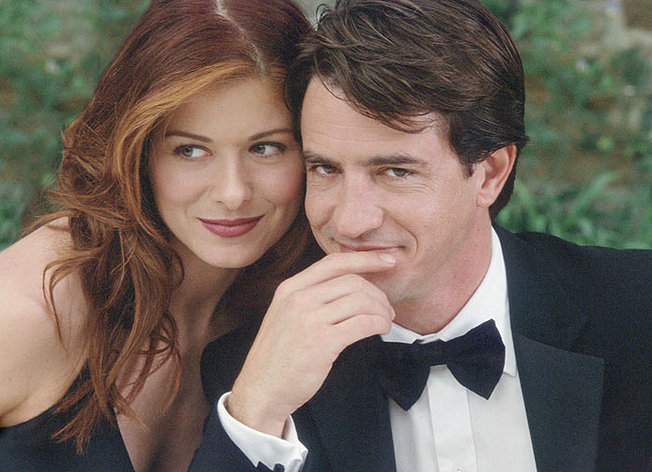
Mr. Tie-Me-Up-Tie-Me-Down
By Taylor K. Long
Hollywood movies are seldom gracious to womankind, but romantic comedies in particular are terrible – designed to appeal to women while painting them with the widest, most unflattering brush possible, crafting tales of beautiful women who are neurotic, insecure, desperate and one-track-minded in their quest to meet a man and get married.
Any time I enjoy a romantic comedy on any level, I can’t help but feel a twinge of guilt for falling into a trap that Hollywood has so obviously set for me. But as a result, I am particularly intrigued about why I’m drawn to those that I am. My DVD collection contains a curious offender – The Wedding Date, which I found for a paltry $5 in a used bin at a Blockbuster one summer. But still. I own it.
While watching The Wedding Date recently, I realized that what makes it interesting as a romantic comedy, and as a movie, period, is that the main male character is a sex object, subjected to the same one-dimensional, bare skin treatment so many women are reduced to. This might happen in smaller doses, with men oozing sex flitting in and out of chick flicks as one-night stands, or other small plot devices, but for the main guy to be viewed, by women, as little beyond a body and a penis is considerably more rare.
Plot-wise, The Wedding Date contains the same pitfalls and tropes as any romantic comedy. Kat (Debra Messing) is flying home to serve as Maid of Honor in her annoying half-sister Amy’s wedding, for which her ex-fiancé, Jeffrey, will be the Best Man. In an effort to make Jeffrey jealous, she’s hired Nick (Dermot Mulroney), a male escort, to accompany her. We’ve got a few major stereotypes in action here: lonely women at weddings, wanting to win back old lovers, the hooker with a heart of gold.
Aside from the obvious sexuality of his profession, Nick is shaped as a sex object in any number of ways, most frequently in comments on his hotness. Before we even get a look at Dermont Mulroney (who is, let’s face it, a serious babe), a flight attendant comments on his appearance. TJ, Kat’s strong-willed and sexually aggressive cousin, frequently remarks on Nick’s sex appeal, quipping at the cocktail reception, when she first sees him, “Oh my god, I’ve just come.” Even Amy calls him “hunky dunky.” Later, Nick appears at the bachelorette party to give Kat her purse, and the group of women paw at and gawk over him, while TJ remarks, “Can you believe Kat gets to shag this guy? No, really, you should send God a bottle of wine or a quiche or something.” Later, at the bachelor party, even the men are talking about Nick’s physique, as Edward, the husband to be, points out to Jeffrey, “He’s less than two percent body fat and shagging your ex-girlfriend.” Nick is as much a sex object in matters of the flesh – he is constantly shirtless, and we see his ass as quickly as the fourth scene in the movie, whereas we never see Kat naked below the upper-chest.
One of the biggest rifts in Kat and Nick’s budding romance is over sex. After agreeing that “intimacy” would be paid for on a case-by-case basis, they inevitably sleep together. Kat feigns not remembering what happened, which, pun intended, Nick interprets as her stiffing him for his services.
Character-wise, we learn next to nothing about Nick beyond his profession. He’s given a handful of somewhat insightful, memorable one-liners, one of the best of which comes during what is, literally, the only time we learn any facts about him as a person. Laying on a bed together, clothed, we’re witness to the kind of cutesy pillow-talk normally reserved for a half-naked-post-coitus scene. “I don’t know anything about you,” Kat laments, and Nick answers, “I’m allergic to fabric softener, I majored in Comparative Literature at Brown, I hate anchovies, and I think I’d miss you even if we’d never met.”
The Wedding Date is far from a perfect movie. It is, still, a romantic comedy with serious plot holes and an unrealistic, neatly tied up ending. Whether or not it passes the Bechdel Test is dubious; the women talk to each other about non-male related subjects for a sentence or two at most. And while it does cast Kat as a woman who cares about her career, it glosses over this for a short scene at the very beginning, only to never deal with it again (and regardless, the “ambitious woman who can’t get a man” is yet another Hollywood stereotype).
It’s not that men (or women) should be trivialized as sexual objects. The best movies give both men and women dimension and character in addition to sexuality – but what makes The Wedding Date a little fascinating is how it flips that mistreatment on its head.


